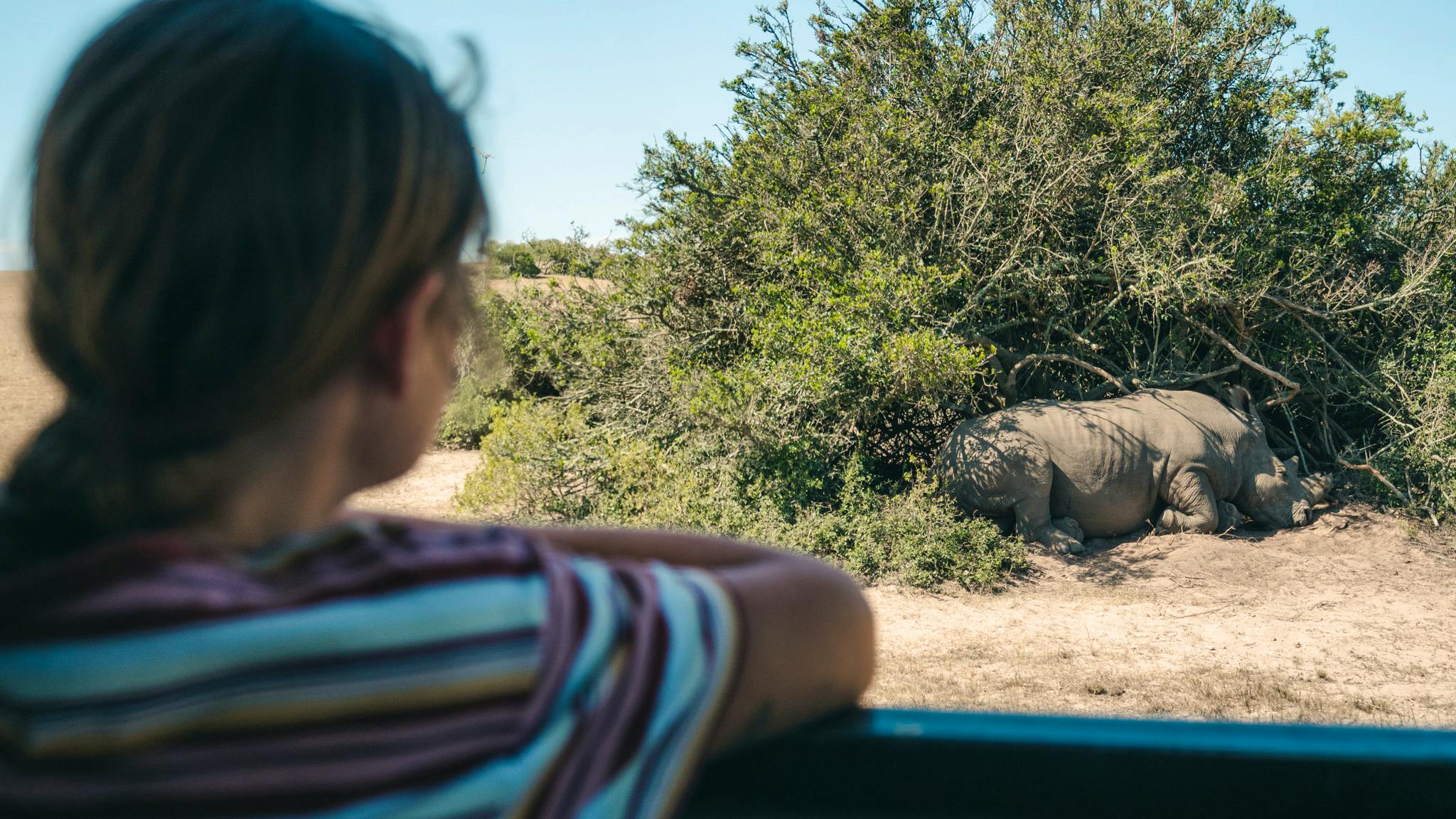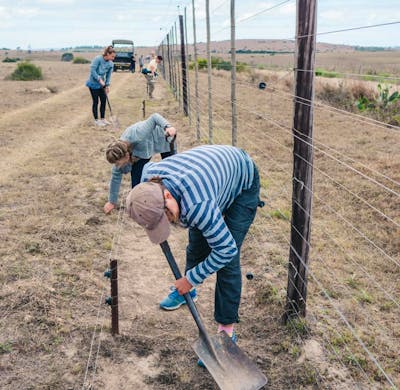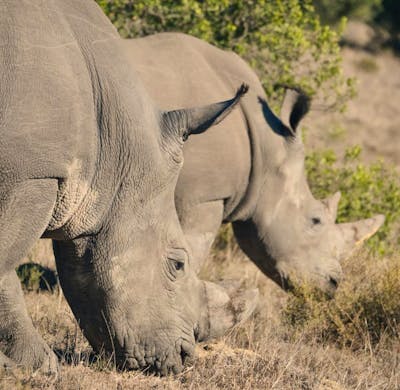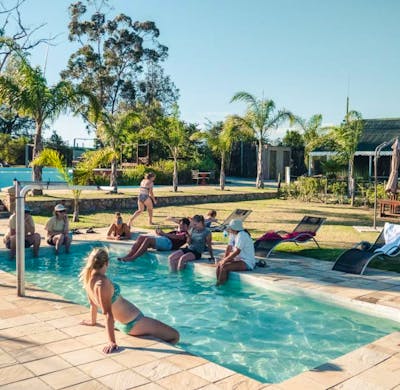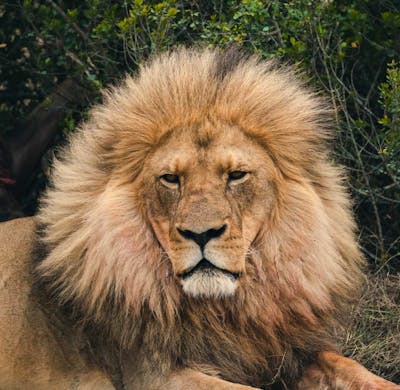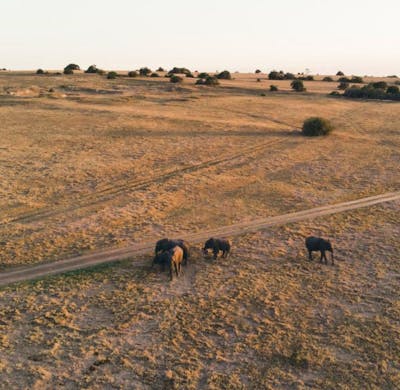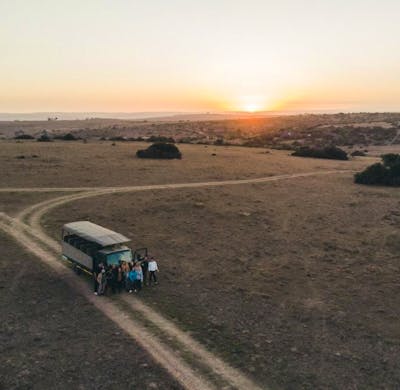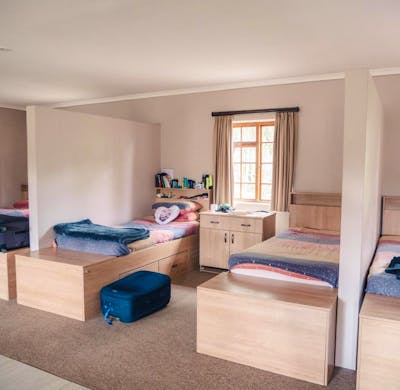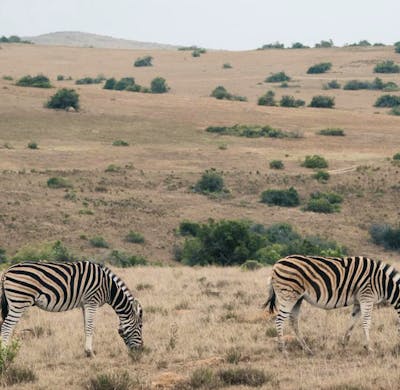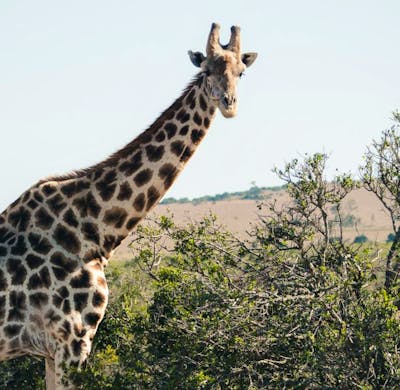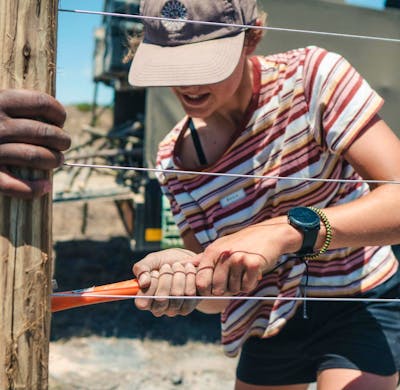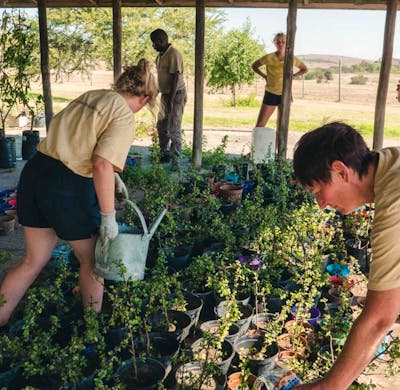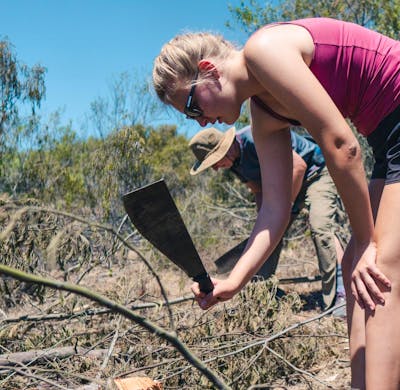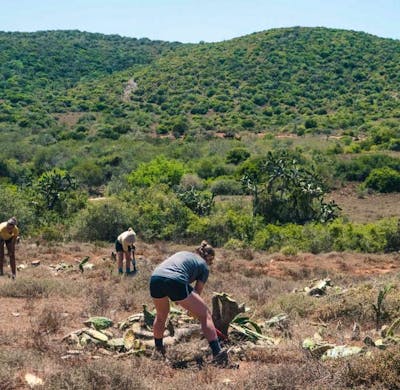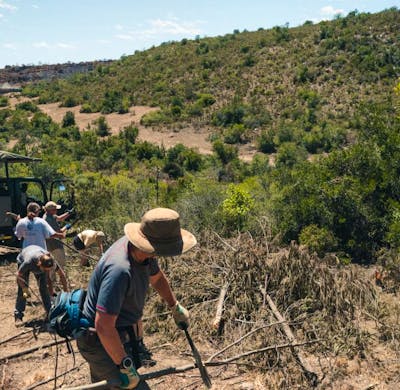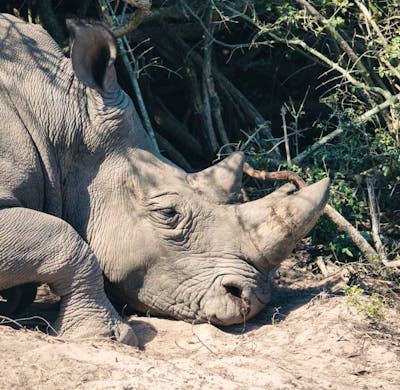As a South Africa Wildlife Reserve Volunteer, you will get the opportunity to work behind the scenes on a world-class wildlife reserve. In addition, you will gain a rich education in conservation management. PMGY’s South Africa volunteer programs provide a fantastic opportunity to engage in meaningful wildlife volunteer work in South Africa. If you have a real passion for animals then this South Africa wildlife volunteer program is the opportunity for you.
BACKGROUND TO THE WILDLIFE PROGRAM
The South Africa wildlife volunteer program is home to vast populations of the incredible 'Big 5'. In Africa, the Big 5 game animals are the lion, leopard, rhinoceros, elephant and buffalo. The term originates from hunters. More specifically, hunters would refer to the animals as the five most difficult to hunt on foot in Africa.
Poaching of wild animals is on the rise in most parts of Africa. Consequently, more species are becoming endangered. Most noteworthy, the Big 5 species represent the highest-profile examples of being threatened with extinction. Other threats come in the form of diseases from domestic animals. Cattle and dogs can easily spread disease into wild animal populations.
Alien species of animals and plants introduced to Africa represent another threat to the extinction of flora and fauna. Whether introduced deliberately or accidentally, alien species compete with native species for limited food and water. Furthermore, the earth’s changing climate is making much of Africa more prone to drought. This puts even more pressure on all species to compete for scarce water. In the same vein, the human population is diverting rivers for their own needs, leaving many other species high and dry.
All of these are exacting a terrible toll on Africa’s once-thriving wildlife. Game reserves and their conservation efforts in South Africa aim to play a role in counteracting these threats. They provide a large area of land where wild animals can live safely. Not only this, they represent a managed ecosystem that encompasses many miles of beautiful terrain.
The focus of a game reserve is specifically on animals (fauna). However, there can be an equal concern with all aspects of native biota of the area (flora, fungi, etc.). Volunteer support in conservation-based activities at the game reserve provides big support to maintaining the flora, fauna and biodiversity.
This project was established to return the natural land to its former glory. This includes being home to the wildlife species that once roamed freely here. Since its beginning, the project has worked hard to successfully reintroduce native wildlife and flora. To help sustain the environment, volunteers take part in a variety of conservation and maintenance-based activities on the reserve.
WILDLIFE VOLUNTEER PLACEMENT
South Africa Big 5 Wildlife Reserve - This fabulous South African game reserve is situated on the Eastern Cape and spans over 6,000 hectares. This experience aims to give volunteers a holistic experience of life on a game reserve. Consequently, as you complete wildlife volunteer work in South Africa, opportunities and exposure will come in abundance. Not only will you be exposed to the majestic Big 5 family but also conservation of all types of fauna and flora. They all go hand in hand.
The game reserves education and rehabilitation centre is home to several species of endangered predators. For example, lions, Bengal tigers and cheetahs. The dedicated conservation team is committed to the preservation of these elusive creatures. Subsequently, this is done through rehabilitation and releasing them back into the wild. The team will conduct such a process whilst considering the effects on a managed ecosystem.
The work is exciting and varied with lots to learn! Naturally, due to the wild and predatory nature of the animals, this is not a hands-on experience. Furthermore, interaction and close-up monitoring of these animals is not an option as a South Africa wildlife reserve volunteer.
Big cats like the Bengal tigers are also found at the centre. Their population has deteriorated at an alarming rate. Over the last 100 years, hunting and deforestation have reduced tiger populations from hundreds of thousands to perhaps fewer than 2,500. The centre has been lucky enough to see the birth of a Bengal tiger cub. This was after an arduous 4 years of work and research at the wildlife sanctuary.
This is a program designed for volunteers interested in having a true African wildlife experience. In other words, on the South Africa wildlife volunteer program, you will make a difference to the local wildlife and environment. Activities for this program vary on a daily basis and are dependent on weather and other factors (so please expect the itinerary to change from time to time!).
The itinerary is designed in such a way that volunteers are divided into groups of up to 10 volunteers per group. Naturally, this is dependent on the number of South Africa wildlife reserve volunteers at the time. Each group will have an outdoor volunteer coordinator as a leader and mentor.
The groups will be engaged in different daily activities. However, each group will all do the same type and number of activities by the end of the week. In some cases, all the groups might do the same activity at the same time depending on the type of activity.
So it is a busy yet highly rewarding and exciting program from start to finish. The dedicated volunteer coordinator will ensure that you have a wonderful learning experience. In addition, the local staff will ensure you make a real contribution to the conservation work at the reserve. Ultimately, you will leave with a stronger understanding of the conservation issues in South Africa.
The volunteer tasks are largely a combination of land management and animal management program activities. Here is just a small selection of the volunteer opportunities you can expect to get involved in during the week on the wildlife volunteering abroad program:
• Lion monitoring
• Rhino monitoring
• Educational lectures and classroom activities within local communities
• Removal of alien vegetation
• Planting of indigenous trees
• Landscaping
• Re-establishment of vegetation and vegetation management
• Fence and anti-poach patrols
• Fence repairs and road maintenance
• Monitoring of predators in the rehabilitation centre
• Game counts
Your efforts will help to make sure the reserve is a safe and suitable environment for these animals to not just survive but thrive. The activities for the week are extremely varied so no two days will be the same. It’s not all work and no play as the program is designed to provide a physical and fun experience every day.
OTHER THINGS TO CONSIDER VOLUNTEERING IN SOUTH AFRICA
Additional Opportunities - On an ad-hoc basis, the local team sometimes arranges evening reptile shows, lectures, and cross-cultural dance shows. Additionally, volunteers may also have the opportunity to experience extra major conservation activities. Examples can include capturing of wildlife animals, game introduction and fire management activities. These activities take place on an ad-hoc basis but certainly provide volunteers with a once-in-a-lifetime experience.
Free Time - It is important to note that the reserve is based remotely. Therefore, volunteers are encouraged to embrace all facilities and aspects of life on the reserve. During free time on the reserve, volunteers have great amenities around them. For example, volunteers can relax in the lounge and swimming pool. Alternatively, choose to enjoy the entertainment room and tennis courts. At weekends, transfers to and from Port Elizabeth run complementary at fixed times from the reserve. Volunteers usually agree on weekend trip plans in one big or two smaller groups, and you can choose what you wish to get up to whilst there, it’s all easy to arrange on a whim.
Cape Town Volunteer Extension - A trip to South Africa is not complete without visiting and exploring everything Cape Town has to offer! PMGY participants joining us at the wildlife reserve project have the opportunity to extend their trip by joining one of our Cape Town community projects for a period of 1 week+. Please note you may choose to join in a tourist capacity or join our Childcare project if doing 1 week in Cape Town. If staying 2 weeks or more, then you are able to join the Teaching Program (if running). Participants will need to fly from Port Elizabeth to Cape Town on the Sunday following the completion of their first program and the one-way domestic flight is included in the extension price.
Weekends - Your project work in South Africa runs from Monday-Friday and weekends are free. You are welcome to relax and hang out at the volunteer accommodation but most participants will use this time to travel and explore the country. As a result, you can check out our South Africa Weekend Travel Guide for top tips on how to spend your weekend.
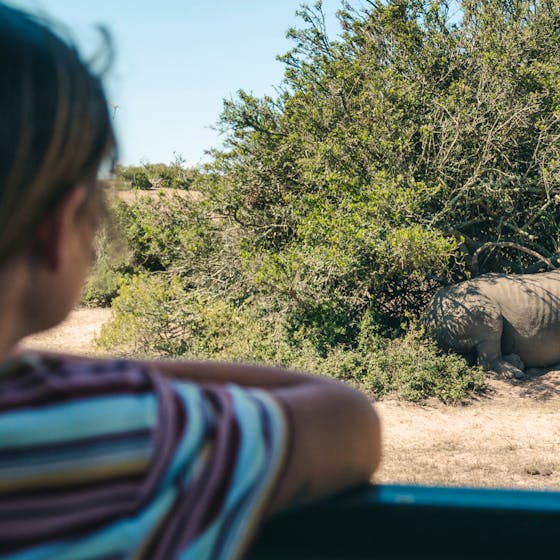
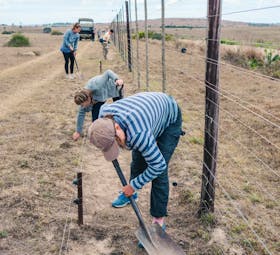
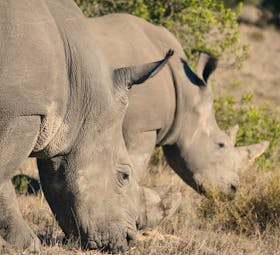
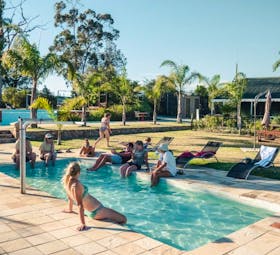
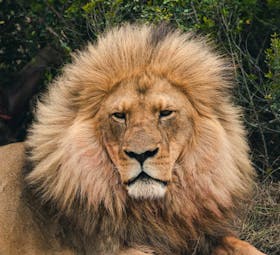

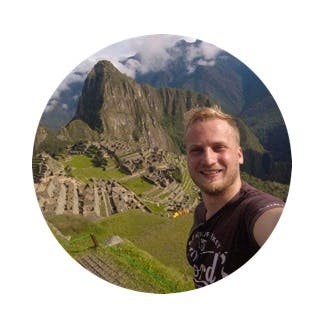
 4.9
4.9

